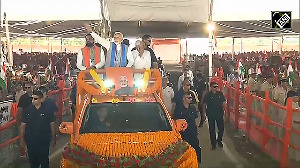House owners may soon get some relief from the double stamp duty incidence that currently occurs on property transactions.
According to the 2006 National Urban Housing and Habitat Policy, that is awaiting Cabinet approval, stamp duty would be imposed only on the first transaction of land.
The policy states: "Group housing needs to be encouraged by societies and co-operatives. Stamp duty in such cases at the stage of raw land and first sale thereafter would be imposed on a value added basis, so that transaction costs are not artificially high to the first purchaser and housing land remains a liquid asset."
In other words, it implies the following: Say a builder purchases land for an apartment complex for Rs 50 lakh (Rs 5 million) and decides to sell each apartment for Rs 1 crore (Rs 10 million). The buyer of the apartments would then pay stamp duty only on the value of the house, as per the sale agreement, and not the land.
Currently, stamp duty would have been levied both on the land and the apartment.
Stamp duty varies from state to state and, therefore, the exact revenue impact of the proposed legislation is difficult to determine.
For instance, Haryana has a stamp duty of 8 per cent, Uttar Pradesh 10 per cent and Punjab 6 per cent in rural areas and 9 per cent in urban areas.
Typically, to avoid double incidence of stamp duty, land is held in a company that is not building the houses. At the time of the sale of the residential unit, the land holding company transfers the land to the buyer.
"This move will be hugely beneficial for property buyers. The service tax law has a concept of group housing called residential complexes that can have more than 12 residential units. These units can be apartments or even row houses," said Satya Poddar, partner, Ernst & Young.
The proposed legislation may actually increase revenue collections from stamp duty.
"Whenever tax burden is lifted, compliance improves. Since people were doing everything to avoid double tax, they might just pay the tax now," said Poddar.







